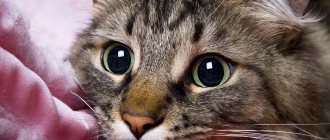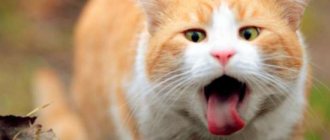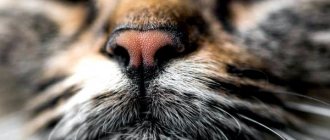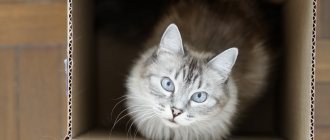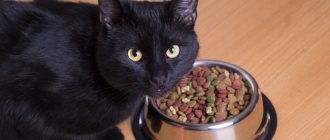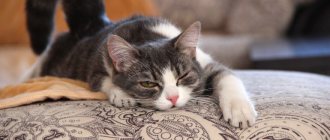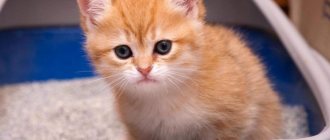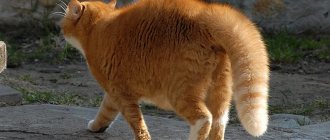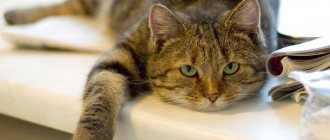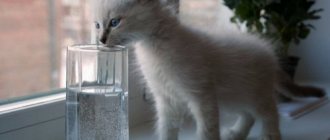How does the condition manifest?
In cats, periods of increased activity are usually followed by apathy and drowsiness. It is difficult for owners to understand why and at what exact moments this happens. Therefore, a situation where a cat is lethargic, hardly eats and sleeps a lot, is alarming.
The owner should clearly know that poor appetite and less active behavior do not always indicate an illness in the animal. And the veterinarian is sometimes unable to understand why the cat is lethargic. The observations of an attentive and loving owner are extremely important here.
The main signs of cat health, in addition to good appetite and good spirits, are:
- shiny and smooth coat;
- pink and slightly moistened mucous membranes;
- cold and slightly damp nose (normally, during sleep it can become warm and dry);
- pulse, respiratory rate and temperature are within normal limits;
- absence of excessive discharge from the eyes, ears and nose, plaque in the mouth, salivation and unpleasant odor from the mouth and ears.
It is important! The normal duration of rest for a cat per day is 12-14 hours or more.
Possible pathological conditions
If the cat has been lethargic for several days, sleeps a lot, drinks and eats poorly, and can barely walk, the owner should under no circumstances let the situation take its course. Such a condition in the pet’s body most likely signals the development of a serious disease. The cat must be shown to a doctor in the next few hours.
Anemia
Anemia occurs when a cat's body produces less red blood cells and hemoglobin.
In addition to the fact that with anemia, a cat is lethargic and sad, it also exhibits other signs of this unpleasant disease:
- the nose becomes lighter;
- mucous membranes acquire a bluish tint;
- blood pressure decreases;
- the pulse is sometimes rapid, sometimes rare;
- breathing accelerates, shortness of breath appears;
- the fur becomes dull and may fall out;
- clear discharge appears from the nose.
Diseases of the cardiovascular system
If the cat eats poorly and constantly sleeps, is lethargic, tries to walk less - these may be signs of the development of a disease of the cardiovascular system.
Your pet may be bothered by fluctuations in blood pressure.
It is important! Normally, blood pressure in cats can “jump” from 105/65 to 135/95 mmHg.
With high blood pressure, furry couch potatoes experience:
- lethargy;
- decreased vision (while moving, the cat may bump into furniture and other objects);
- rapid pulse;
- dilated pupils;
- redness of the eyes;
- sometimes vomiting;
- in some cases - nosebleeds.
With low blood pressure, the pet refuses to eat due to nausea, sleeps a lot, its pulse slows down, and the cat may even lose consciousness.
In acute heart failure, the animal is also lethargic, its breathing becomes difficult, shortness of breath and bluish discharge from the nose appear.
An important symptom of the development of heart disease in a cat is its characteristic posture in a relaxed state. She usually stands with her front legs spread wide. This makes it easier for her to breathe.
Gastrointestinal diseases
Often the cause of a pet's lethargic and sleepy state and his refusal to eat are diseases of the gastrointestinal tract.
With gastrointestinal pathologies, a cat may exhibit symptoms:
- bloating;
- stools that are very dark, almost black, or mixed with blood and mucus;
- belching;
- constipation;
- flatulence.
Diseases of the urinary system
The development of urinary system diseases in cats, in addition to a lethargic state and lack of appetite, is accompanied by symptoms:
- too frequent or infrequent urination, or its complete absence;
- constant pain when urinating;
- the appearance of blood or pus in the urine;
- sweetish smell from the mouth;
- lower back pain;
- extremely unpleasant odor of urine.
To reduce pain at least a little, the animal lies down almost all the time, does not drink or eat.
It is important! If your pet has a blockage in the urethra, without medical attention he may die within 3 days.
Infectious diseases
In many cases, a cat’s lethargic behavior, refusal to feed and staying in almost constant sleep indicate an infectious disease.
Such diseases are extremely dangerous for cats and require immediate medical attention. The owner must remember that the life of his pet is literally counted in minutes.
The most dangerous infectious diseases that cause cats to become very lethargic are:
- Leptospirosis: Caused by the bacterium Leptospira. The disease affects almost all cat organs and is very dangerous for humans;
- Calcivirosis is a viral disease that affects the respiratory tract. It occurs mainly in cats under 2 years of age, but sometimes in older individuals;
- FIV is feline viral immunodeficiency: an extremely dangerous disease that affects the immune and nervous systems. Only representatives of the cat family, including wild representatives, can become infected with it;
- Panleukopenia (popularly called feline distemper) is a deadly disease that develops very quickly. It affects the cardiovascular, digestive and respiratory systems of the cat and is accompanied by intoxication of the entire body;
- herpes virus infection (another name is rhinotracheitis): caused by the feline herpes virus. Affects the respiratory and visual organs. If the animal is weakened by other diseases and does not receive proper treatment, the infection can lead to death.
The main signs of a cat becoming infected with a dangerous infection:
- lethargy and apathy;
- lack of appetite;
- high body temperature (above 40°C);
It is important! Normal body temperature in adult cats is 38-39°C, in small kittens – 38-39.6°C, in sphinxes – 38-41.5°C.
- labored breathing;
- cough and wheezing;
- vomit;
- foul, greenish diarrhea;
- bloody discharge from the mouth, nose, ears, eyes;
- soreness in some parts of the body.
Intoxication
Poisoning of the body (intoxication) in cats, in addition to lethargy and refusal to eat, is indicated by:
- diarrhea;
- vomit;
- increased salivation;
- increase or decrease in body temperature;
- redness or blueness of mucous membranes;
- constant feeling of thirst;
- convulsions and so on.
If you suspect poisoning, you should try to induce vomiting in the cat so that the body can at least partially get rid of toxins, and then take it to the veterinarian.
However, if more than 2.5 hours have passed since the poisoning, it is better to transport the pet to a veterinary hospital as soon as possible. After all, during this time, toxic substances have already spread throughout the circulatory system throughout the body.
In order to protect your furry pets from intoxication, you need to know its main causes:
- stale or poor quality food;
- contaminated drinking water;
- bites of snakes and poisonous insects;
- helminth infection;
- bacterial and viral infections;
- violation of hygiene rules when keeping animals;
- eating poisonous plants, fertilizers, chemicals;
- uncontrolled use of medications;
- individual intolerance to certain components of feed, hygiene products, etc.;
- exposure to toxic fumes from paint and varnish products.
Parasites
The cause of lethargic behavior and drowsiness can be a cat’s infection with external and internal parasites (fleas, ticks, worms).
Flea and tick bites cause itching and pain in cats. As a result, due to constant scratching, wounds appear on the skin, and the hair begins to fall out.
A cat with ear mites often shakes its head and scratches its ears, in which a lot of wax with an unpleasant odor can be found.
Cats infected with worms are often lethargic. Other signs of the disease:
- bowel disorder (diarrhea or constipation);
- vomit;
- itching and irritation in the anal area;
- temperature increase;
- bloating;
- the presence of eggs and particles of worms in the feces.
If external or internal parasites are detected in your pet, you need to begin exterminating them as soon as possible. The veterinarian will prescribe the medications.
The fight against parasites is very important, because they are quickly transmitted to both other animals and humans.
Signal of a foreign body entering the digestive tract
Most owners often encounter this problem, which is especially typical for playful cats of long-haired breeds. These could be small fragments of toys, small bones, or simply large accumulations of fur from the animal itself. The main signs for identifying this factor are attacks of vomiting that occur when drinking water and food, abdominal pain and difficulty defecating. With prompt diagnosis and timely removal of the foreign material, the pet will recover completely.
If the fluffy doesn't eat or drink, his nose is dry
There is an opinion among owners that a dry nose in a cat indicates the presence of a certain disease. However, this rule does not work in all cases. If you touch your cat's nose after sleep , you will find that it is dry. Therefore, the conclusion that the cat is sick will be incorrect. If your pet doesn't eat for several days and she still has this symptom, then you shouldn't wait any longer and it's time to take her to the vet.
You should not place high hopes on self-medication, since such methods may not always be effective. If the nose is dry, it won’t hurt to touch the cat , because it is possible that its temperature is elevated. If you find this symptom, then this is another reason why you should immediately show the animal to a veterinarian.
Signs of poor appetite
If an animal sometimes refuses to eat, then there is nothing wrong with that. You may not always notice weight loss right away. Cats that live indoors need less food. Therefore, they may sometimes not feel hungry and drink only water.
Loss of appetite may be a sign of serious problems
Veterinarians identify several thinness indices. When exhausted, the animal's ribs clearly appear; if you look at it from above, its figure will resemble an hourglass. The stomach is strongly retracted.
If the cat is underweight, the ribs and spine will be clearly palpable, and there will be no fat layer. With normal weight, the animal looks like an even rectangle from above. The ribs can be felt during normal examination, but a small amount of fat will be felt.
Important! Being overweight is just as dangerous as being underweight.
The owner should only start to worry if the cat is emaciated or underweight. In this case, it is better to consult a veterinarian to determine the cause of the weight loss.
Sometimes the condition is accompanied by additional symptoms - vomiting, drowsiness, lethargy. All this may indicate the development of a serious illness. A particularly dangerous sign is refusal of water.
What to do if the kitten does not eat.
If a kitten does not eat, this is always a reason to take a very careful look at its condition. If the lack of appetite in kittens is the first sign of an acute viral infection, then the count is not in days, but in hours. And the sooner you seek help from a veterinarian, the better the baby’s chances. Unfortunately, kittens are very susceptible to infections and they can occur at lightning speed, with high mortality, even with proper treatment. Especially if the kitten is weakened by other factors:
- parasites
- malnutrition
- hypothermia
- lack of vaccination
- stress.
The younger the kitten, the higher the risk of a bad outcome, since the immune system is not yet ready to fully fight viruses.
But let's take things in order. The first thing to exclude is not diseases, but the influence of third-party factors:
Type of feed.
Kittens' eating habits are formed in the first 3-4 months after birth. In many ways, their taste preferences in life depend on what is offered to them during this period. The consistency, texture of food (dry food/pates/pieces, etc.), its smell, and temperature are very important. If you are adopting a kitten, find out exactly what the previous owners or breeders fed it. And for the first time, feed in the same way. And when the kitten gets used to its new home, then you can gradually switch it to the food you want.
Avoid sudden changes in food, do not introduce several new products at the same time.
- The kitten has already eaten something without your knowledge.
- Check if the kitten's bowl is located in a convenient place. It should not be located next to the cat litter box, nor should it be in the walkway. If there is a dog in the house, it is better to feed the kitten on a hill so that the dog does not disturb it. If there are several cats in the house, then at first you need to keep an eye on it so that the older cats do not intercept the baby’s food.
- Stress after moving to a new home, traveling in a car or transport, going to the veterinarian, guests, active children - any factor can be the cause of a kitten’s poor appetite.
The most common diseases that cause a kitten to refuse to eat:
- First of all, these are parasitic diseases. 90% of kittens have worms and/or protozoa, even if they come from a “good” family and their mother was treated for worms. There is no doubt about kittens picked up on the street. The presence of helminths will also be indicated by the following signs:
- increase in abdominal volume
- bloating
- flatulence
- soft or loose stools, mucus or blood in the stool
- underweight kitten
- absence or, on the contrary, increased appetite.
If the kitten is very exhausted or has other parasites, it is best to treat it for worms under the supervision of a doctor. Since the massive death of parasites can worsen the baby’s condition.
- Viral infections. As described above, this is a very dangerous situation for the health and life of the kitten. Most often in small kittens, calicivirus and herpesvirus infections occur (mainly affecting the respiratory organs - nose, trachea, bronchi, lungs, and eyes), panleukopenia (affects the gastrointestinal tract, destroys the immune system). All of these diseases are life-threatening. And they require prompt intervention from a specialist.
- Diseases of the gastrointestinal tract. At a young age, in addition to inflammation of the stomach and intestines of a parasitic and infectious nature, foreign bodies and poisoning are more common when the kitten has eaten something inedible and harmful (leaves of poisonous plants, chocolate and other “goodies”)
For kittens, the recommendation not to self-medicate is doubly relevant. And if the condition of your four-legged baby causes concern, seek professional help as soon as possible. This could save his life.
CALL, take care of your pet's health!
VET CLINIC DOG AND CAT
Kharkov (M. 23 August) st.
Novoprudnaya, 9B OPENING MODE: ROUND THE CLOCK
Call center:
☏ (057) 751-32-42 ☏ (063) 722-88-48
☏ (066) 875-31-13 ☏ (096) 880-89-11 viber
Why does a cat eat little and sleep a lot for several days?
In most cases, the reason for a cat's lack of activity is due to trivial reasons.
Why does a cat eat little and sleep a lot for several days, reasons:
- The advanced age of the animal . If the cat is more than 10 years old, you shouldn’t be surprised if it turns from an active, cute kitten into a lethargic pet. Animals, like people, move less in adulthood and develop a large number of chronic ailments.
- Condition after estrus . If you have been breeding a cat, then do not be surprised if 3-4 days after this process it becomes lethargic. Over the course of 3-4 weeks, the animal will be quite lethargic and behave differently than usual. This indicates that the mating was successful, the animal needs rest, as well as good care, in order to raise strong and healthy offspring.
- Increase in ambient temperature . At a temperature of +30, not only people, but also animals do not feel very good and cheerful. The animals have decent fur, with the exception of sphinxes. Therefore, pets feel bad; often in hot weather, animals prefer to hide under the sofa, bed and in places where it is quite cool and sunlight does not penetrate. Pets hide, sleep a lot and are reluctant to come when called.
Kittens
Possible causes of lethargy in healthy animals
Often there are reasons why a cat is lethargic, sleeps all the time and eats little, but it is better to understand each of them in order.
Stress
It is not uncommon for a cat to eat poorly and sleep a lot after a serious nervous shock.
Cats are very sensitive animals, so they have many causes of stress:
- travel by car;
- the arrival of a new family member or pet in the house;
- change of owner;
- repair or rearrangement of the house;
- visit to the veterinarian;
- change of place of residence by owners;
- lack of attention from the owner;
- pain;
- recent surgery;
- visit of guests;
- bathing and other hygiene procedures;
- changes in daily routine;
- the appearance of new and unusual objects in the house;
- first time on the street.
Usually cats cope with this situation quite well without medical help, but they really need the support of their beloved owner. However, in some particularly susceptible cats, stress lasts for quite a long time and can even be harmful to health.
The main physiological signs of nervous shock in a cat:
- urinary incontinence;
- rapid breathing;
- diarrhea or constipation;
- increased cleanliness (a cat can lick itself until bald spots appear on its fur and irritation on the skin);
- yawning too often;
- urinating in inappropriate places (the cat is marking its territory).
It is important! If, as a result of stress, the cat’s behavior does not return to normal for a long time, it is better to show the animal to a doctor. After all, nervous shocks can negatively affect his health and lead to the development of diabetes, skin diseases and disturbances in the functioning of the cardiovascular, digestive and genitourinary systems.
Change of feed
Often the cause of a lethargic state and refusal to eat is a change in diet (for example, switching from natural food to ready-made food and vice versa).
In this situation, you should return the cat to its previous food and treat it with some treat. Then the restoration of appetite and a cheerful state will occur very quickly.
Hot weather
Cats do not have sweat glands. They do not know how to cool themselves by opening their mouths, like dogs. Therefore, in the heat, to protect themselves from overheating, furry pets try to lie more in cool places. In addition, they begin to eat less so as not to waste energy on burning calories received with food.
Age
Over time, many owners begin to worry that their once active and nimble cat has become lethargic, eating almost nothing and lying around all the time. This is easy to explain: older cats no longer have as much energy for play; they sleep longer and more soundly than young animals.
If an elderly pet is lethargic, eats without appetite and sleeps a lot, but at the same time drinks water and has the above signs of a healthy cat, then there is no need to worry. However, an older cat should be regularly taken to the veterinarian for examinations to prevent the development of diseases.
Kittens spend almost 90% of the day sleeping until they reach two months of age. If the kitten is lethargic, plays little and eats poorly during periods of wakefulness, then the best solution is a trip to the veterinarian.
It is important! The maximum duration of healthy fasting for kittens is 1 day, for young cats and middle-aged pets – 3 days, and for “old people” – 2 days. If after this time the cat still does not start eating, you need to consult a doctor as soon as possible.
Pregnancy
In the early stages of pregnancy, many cats, like people, suffer from toxicosis. They become lethargic, try to move less and more carefully, sleep more and often refuse to feed.
If a cat was mated 3-4 weeks before this condition, then after another 5-6 weeks you can expect an addition to the cat family.
If your cat begins to eat little due to kidney failure
There are two types of kidney failure in cats - acute and chronic, which are characterized by refusal to eat. There is severe emaciation of the animal, frequent vomiting and urination, as well as a constant feeling of thirst. A common cause of this condition may be poisoning from flowers of the lily family. The condition of acute renal failure can be treated with timely contact with an experienced veterinarian. Resuscitation facilities and prompt implementation of treatment procedures will help restore your pet’s health in the shortest possible time.
When to rush to the vet
Within 24 hours after discovering that the cat is not eating or drinking, you should simply observe it, paying attention to other symptoms, if any. But even if in general the pet’s condition does not cause concern (refusal of food and drowsiness are the only signs), it is still worth consulting with a veterinarian, because many pathologies have a hidden course (for example, the presence of malignant tumors becomes obvious only in the later stages).
If you have the following symptoms, you should contact your veterinarian as soon as possible:
- vomiting and diarrhea - usually always accompany poisoning or infectious diseases, and also increase the risk of rapid dehydration;
- increased temperature - it should be remembered that a temperature of up to 39 degrees is normal for cats, and only exceeding this indicator indicates a fever;
- rashes of any type - we can talk about both an allergic reaction and an infection;
- hair loss - may be a symptom of an infectious lesion or parasitic infestation.
You should be especially wary if the pet hides in secluded corners and avoids contact with the owner - only very sick animals behave this way.
Reasons for refusal to eat due to cat illness
Oral diseases. Stomatitis is an inflammation of the oral mucosa involving the mucous membranes of the cheeks, palate, gums, surface of the tongue and the mucous membrane of the lips. In cats, catarrhal, vesicular and hemorrhagic most often occur, and much less often ulcerative, diphtheretic and phlegmonous.
Stomatitis in a cat usually begins with catarrhal inflammation of the oral mucosa and is accompanied by: Increased salivation. Increased thirst. Chew carefully while eating (cat stomatitis).
Dental caries is a disease accompanied by progressive putrefactive destruction of hard tissues followed by the formation of a cavity in the affected tooth. The onset of dental caries development is usually overlooked by cat owners. The owner of a cat can detect dental caries in his cat due to difficulty in eating and chewing food, as a result of the appearance of a pain reaction, the presence of salivation, the loss of swallowed food particles from the oral cavity and an unpleasant odor (bad breath in a cat) that comes from the cat’s oral cavity, purulent or bloody discharge from the mouth.
Tartar. An unpleasant odor emanates from the cat’s mouth, we note atypical behavior in the cat when eating (arising from pain), the cat begins to refuse food, and exhaustion is observed (tartar in the cat).
Wounds and abscesses in the cat's mouth are accompanied by pain, which makes it difficult for the cat to eat, and as a result the cat refuses to eat.
Ear disease. Ear diseases in cats can be non-contagious or contagious in origin.
Otitis. Otitis in cats can be due to inflammation of the outer, middle and inner ear.
Causes of otitis. The cause of otitis in cats can be food allergies, the presence of parasites (ticks, fleas), ear injuries, foreign bodies, etc. Otitis of the middle and inner ear can be the result of complications of inflammation of the outer ear.
Signs of otitis. During a clinical examination of a sick cat, the skin of the sore ear is reddened, the cat rubs the sore ear with its paw, and tries to keep the sore ear folded and pressed to its head. If the pain in the ear is acute, “shooting,” the cat suddenly jumps up, looks around in fear, and screams. With constant pain, the cat does not allow the sore ear to be touched, avoids stroking the head, and presses the sore ear to its bedding. With purulent otitis media, inflammatory exudate is released from the cat's ear; when touched, the ear gurgles and squelches. An unpleasant odor emanates from the diseased ear. In advanced cases, in the absence of proper treatment, the cat’s body temperature rises, the cat becomes depressed, and there is no appetite. If timely treatment measures are not taken, the eardrum may be perforated, and the inflammatory process can spread to the brain (ear diseases in cats).
What to do?
Having realized that something is wrong with the cat, the owner needs to decide what to do first in this case.
If the cat is lethargic
If you observe a complete lack of appetite in your cat for several days, the first thing you should do is change its diet. If you gave your pet new food in the morning and he hasn’t touched it all day, then most likely the reason is food. To switch your cat to a new food, you can do the following: take some food and mix it with the old food, reducing the amount over time.
It is possible that the whole problem is in the dirty bowl from which the cat eats. To prevent this from happening, you should wash your pet’s dishes after every meal. Another reason for a cat refusing to eat may be the incorrect location of the bowls. To determine whether this is true or not, you can put your cat's bowl in a different place and see if he touches the food. You may not have to do anything else.
If you have tried all the methods, but nothing has helped you understand why your cat has not eaten for several days, then all you have to do is show it to the veterinarian . Considering the ineffectiveness of the recommendations given, it can be assumed that this is a serious illness. Therefore, it is important to start treatment as soon as possible.
How and how to help an animal
If a cat refuses food and water, then the first thing to do is take your pet to a veterinarian. It is not possible to make a diagnosis on your own at home, so you need to call a doctor at home or take your pet to the clinic.
If it is impossible to get to the veterinarian in the next 24 hours, then you need to provide the cat with rest. To do this, you should prepare a clean litter; it should not be too soft or too hard. If an animal is hiding, you should not force it out of its hiding place. You can only place a bowl of food and fresh water nearby.
Bowls of water and food should always be available to the animal.
If the doctor has determined the cause, then you should follow the specialist’s recommendations and give medications according to instructions in the required dosages. This must be done calmly; you must not cause pain to the animal. Before giving medication, the cat needs to be stroked, and the tone of voice should be calm. This way, the pet will tolerate the treatment better, will not resist too much and will recover faster.
Additional recommendations:
- If the cause is stress, then the cat should be left alone for a while. It is advisable to call her to eat in a gentle tone. A calm and quiet environment, the absence of extraneous noise and periodic stroking will help you recover from stress.
- If your pet doesn't like the food, you need to replace it as soon as possible. It is recommended to give preference to balanced foods rather than cheap options containing a lot of harmful additives.
- In case of gastrointestinal upset and poisoning, you can give the animal activated charcoal (500 mg per 1 kg of weight). In this case, the tablet must be crushed and dissolved in 1 tsp. water. It is most convenient to give medicine using a syringe without a needle. It is enough to do this procedure once before seeing a doctor.
- Ticks and fleas are eliminated using special antiparasitic medications. You should not use them on your own; you should first consult your doctor. However, if this is not possible in the near future, and the animal has fleas or a tick is found, you can purchase Bars or Celandine shampoo.
- If the cause is helminthic infestations, then treatment is carried out with the help of anthelmintic drugs. The medication should be given only according to the regimen recommended by the doctor. Otherwise, larvae may remain, which will provoke a relapse.
- To alleviate the condition of an animal with gum inflammation, you can use a solution of Miramistin or potassium permanganate. It is necessary to treat the gums using a cotton pad and the selected product. This needs to be done 2 times a day. Do not press on problem areas.
A weak solution of potassium permanganate can be used to treat inflamed gums
If an animal does not eat or drink, and also sleeps constantly, then this is an alarming signal of serious health problems. However, in extremely rare cases this is associated with stress. In this case, the pet should be left alone and allowed to rest. There is no danger in inactivity after stress. If the animal is lethargic, does not eat or drink for another reason, then postponing a visit to the doctor is dangerous, since with a serious pathology the cat may die.
Some recommendations that will help you hold out until the doctor arrives:
- It is necessary to ensure that fresh air enters the room.
- Do not disturb the pet. If there are other animals in the house, then for safety reasons it is better to isolate them from contact with the sick cat.
- Make sure the water in the bowl is always clean.
- If there is a special medicinal herb for cats in the house, which breeders often grow in pots, then you can pick a little and put it next to your pet. If desired, the animal can be treated with such a safe remedy.
How to help a kitten
If the kitten does not eat anything or drink water, then first of all you need to pay attention to the nature of the food. Small pets need special soft food. It is impossible to give a kitten food intended for adult animals, since the gastrointestinal tract of babies is still very weak. Long-term refusal of water is dangerous, so you can give your pet water using a pipette. Every hour you need to give water forcibly. The liquid should be administered in small quantities - one pipette at a time is enough.
Giving your kitten water using a pipette will prevent dehydration
In addition, the kitten should be carefully examined for rashes, sores and fleas. Particular attention should be paid to the withers and ears. If everything is clean, then most likely the problem lies in the functioning of the internal organs, which can only be determined in a clinical setting.
What diseases are most often accompanied by cats refusing to eat?
Diseases of the teeth and oral cavity.
In such a situation, very often a cat may want to eat, be interested in food, but when approaching a bowl or trying to eat something, it will refuse the food offered. He may take a piece into his mouth and spit it out, or try to eat on one side. The most common dental problems:
- injured teeth
- tartar
- gum inflammation
- ulcers on the tongue (often associated with viral infections, chronic kidney disease)
- different types of stomatitis in cats
- abscesses
- foreign objects stuck between teeth or in soft tissues
- oral tumors.
You can read about the prevention of dental diseases on the website page (link to Dentistry).
Diseases of the gastrointestinal tract.
A cat may not eat or eat poorly if it develops any of the following gastrointestinal problems:
- inflammation of the stomach and intestines of any nature (nutritional, bacterial, viral, parasitic, poisoning) - acute or chronic gastritis, gastroenteritis, duodenitis, colitis
- inflammation of the pancreas (pancreatitis), associated triaditis (complex inflammation of the small intestine, pancreas and bile ducts)
- foreign bodies (pilobesoars - hairballs in the stomach, threads, pieces of toys, animal bones, fruit seeds - the range of foreign bodies is wide and unpredictable)
- diseases of the liver, gall bladder and bile ducts - hepatitis, cholangitis, liver lipidosis
- parasitic diseases (caused by helminths - simply worms, protozoa)
- oncological diseases of the gastrointestinal tract - such as the intestinal form of lymphoma.
As a rule, diseases of the gastrointestinal tract will be accompanied by other symptoms - vomiting, diarrhea, constipation, weight loss over a long period of time. In this case, you should not engage in self-medication or treatment over the Internet, but consult a doctor with your pet as soon as possible. Cats can very quickly become dehydrated and suffer complications associated with it. To establish a diagnosis after examination by a doctor, additional research methods will most likely be required - clinical and biochemical blood tests, stool tests, ultrasound, and in some cases x-rays.
Kidney diseases
Kidney diseases are literally the scourge of cats and, perhaps, one of the most common groups of diseases. The difficulty is that they can be asymptomatic for a very long time: the cat is simply a little less active, eats a little worse, and has lost a little weight. They clearly appear already at the stage when the functional tissue of the kidneys is destroyed by more than 70%. And these changes are irreversible. Only early diagnosis using a set of indicators can help here: regular measurement of blood pressure (link to an article on measuring pressure), urine analysis to determine the ratio of creatinine and protein, blood test for creatinine.
Diabetes
Diabetes mellitus is one of the most common endocrinological diseases in cats. In addition to lack of appetite, it will be accompanied by lethargy, increased thirst, frequent urination, and a characteristic “hare” gait. Overweight animals are predisposed to it.
Viral infections
Acute viral infections, in addition to a decrease in appetite, will be simultaneously accompanied by an increase in temperature (link to our YouTube video - How to measure a cat’s temperature. It is necessary to remove
